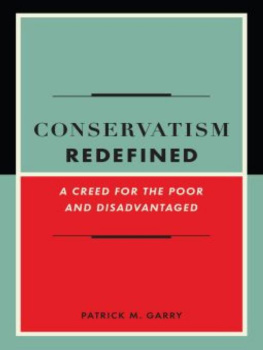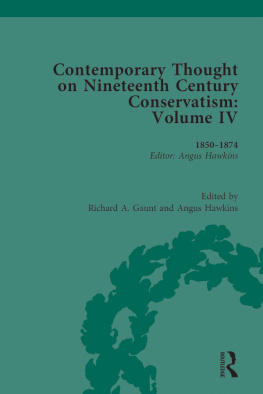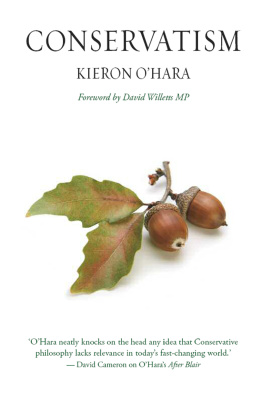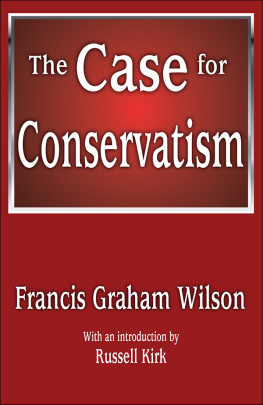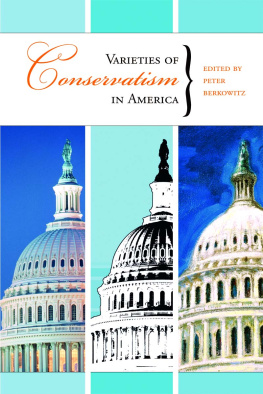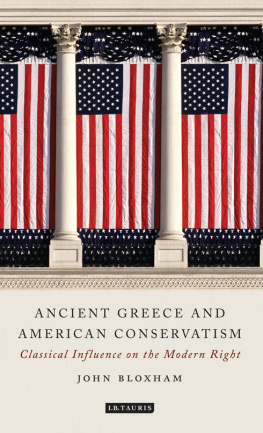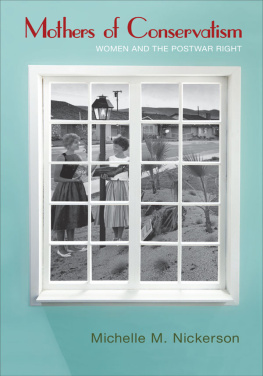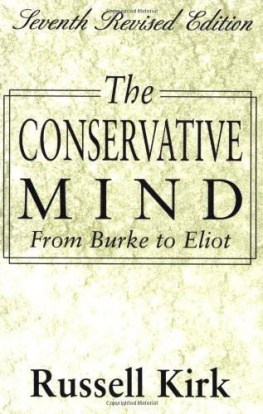PRAISE FORCONSERVATISM REDEFINED
Professor Garrys book is a welcome edition to the burgeoning literature on conservatism. He effectively debunks liberal critics and encourages followers with an historical and cultural analysis that shows how the basic principles of conservatism are relevant to our present situation. His conclusions about the Bush presidency are sure to prove as controversial as they are insightful.
David Woodard, Professor of Political Science,
Clemson University; author of The America That
Reagan Built and The Conservative Tradition in
America
Patrick Garrys important new book shows how conservatism, understood as expressing the wisdom of time and as committed to upholding human dignity, is the best prescription for social comity and the advancement of the poor and disadvantaged.
Brian C. Anderson, Editor, City Journal; author of
South Park Conservatives and A Manifesto for Media
Freedom
As conservatives begin to plot their political comeback, they will do well to read and study Patrick Garrys thoughtful suggestions on the importance of returning to first principles and applying these values to the plight of the downtrodden.
John J. Miller, National Review
What greater accolade could I give to Conservatism Redefined than this: Would that I had written it? Patrick Garrys work merits high praise for his nuanced understanding of conservatism and for his superior writing style. Conservatives and liberals of all persuasions should read Conservatism Redefined, which is a tour de force about todays conservatism.
Dr. Charles W. Dunn, Dean, Robertson School of
Government, Regent University; editor, The Future
of Conservatism and author of The Seven Laws of
Presidential Leadership
Patrick Garrys book is a comprehensive, spirited, and humane defense of the bedrock conservative principles in America. I congratulate him.
David F. Forte, Holder of the Charles R. Emrick, Jr.
Calfee Halter & Griswold Endowed Chair at the
Cleveland-Marshall College of Law; editor, National
Law and Contemporary Public Policy
Conservatism Redefined does an excellent job in addressing an important topic at a crucial time. It digs below the passing events of the moment and gets to the issue of what conservatism is all about.
George W. Dent, Jr., Schott-van den Eynden Profes
sor, Case Western Reserve University School of
Law; Director, National Associate of Scholars;
Chair, Ohio State Advisory Committee to the
U.S. Commission on Civil Rights
INTRODUCTION
THE CRISIS FOR CONSERVATISM
In his 1988 presidential campaign, George H. W. Bush derided the L wordliberalism. Indeed, the focus of his campaign was often not on what he was, but on what he was nota liberal. Twenty years later, howeverand after eight years of his sons presidencyit is conservatism that has become the dreaded political label.
Conservatism in America is mired in its worst crisis since the 1960s. This crisis accompanied the decline in public opinion of the younger Bushs presidencya decline that seemed to touch off a torrent of criticism against conservative values and policies. But many of those criticisms were misplaced. Partisan politics do not often truly reflect a coherent political ideology; in fact, many of the actions and positions of President Bush and the 2001-2007 Republican Congress hardly qualified as conservative. Furthermore, the policies and actions of individual presidents cannot fundamentally alter or even define a long-standing political ideology. Yet on a short-term and often superficial basis, the popularity of prominent political figures can influence the public image of the ideologies those figures profess to follow. Consequently, just as the failures of a Democratic president bring criticism and disparagement to political liberalism, an early casualty of an unpopular Republican presidency is often the credibility of political conservatism. Though it can be expected that the unpopularity of the Bush presidency has shaken the publics confidence in political conservatism, however, the long-term strength of the conservative ideology ultimately will be determined not by individual politicians but by the wisdom and relevance of the ideology itself.
The current crisis of conservatism arises not only out of attacks from the outside, from its partisan and ideological opponents, but also from increasing doubt and confusion within conservative ranks. And this doubt and confusion results in large part because of conservatives failure to keep reexamining and renewing their ideology. Indeed, some of the confusions and seeming contradictions of the Bush presidency may have resulted from an underlying conservative ideology that had become stale and uninspired.
Throughout the 1960s, 1970s, and 1980s, conservatives worked diligently at energizing their political philosophy. But with their political successes over the past couple of decades, conservatives have become complacent in their intellectual rigor and have gradually lost sight of the need to continually debate and scrutinize their principles and ideas. This constant scrutiny is particularly necessary because of the complexity of American conservative thought.
Modern American conservatism has become a complicated collection of various ideological strands and factions: traditionalists, who value social order and civic virtue; libertarians, who focus on individual freedom; religious conservatives, who oppose the banishment of religion from the public sphere; and neoconservatives, who combine a democratic idealism with an assertive foreign policy. President Ronald Reagan united these strands in his battles against Soviet communism abroad and a suffocating government bureaucracy at home. But in recent years, the different sects of conservatism have fractured in their approach to such issues as immigration, government spending, foreign military intervention, environmental protection, and international trade.
After a Republican Congress that ran up record deficits and became mired in lobbying scandals, after a foreign policy that made the U.S. the caretaker of an intensely divided and dysfunctional Iraqi society, and after an administration whose signature domestic programs included a massive federal prescription drug entitlement program, the federalizing of education, and an alliance with liberal Democrats on illegal immigration, conservatives are uncertain about how their current governing philosophy or agenda fits with the principles of the past. For the first time in decades, no recognizable conservative candidate even sought the Republican Party presidential nomination in 2008. The low state of conservative energy and optimism could also be seen in the relative retreat of conservative donors and activists from the 2008 presidential election. In comparison with the activism and financial contributions of liberals, the lethargy of conservatives was striking.
The current state of American conservatism, however, cannot be judged just on the performance or popularity of the Bush presidency or the Republican Congress. Indeed, some of the criticism leveled against President Bush was both unwarranted and overblown. For instance, President Bush was never given adequate credit for his success in preventing another expected terrorist attack on American soil, nor was he credited for his attempts to improve the tone and ethical standards of the presidency. In addition, President Bush did try to reinvigorate the debate over the meaning of conservatism with his advocacy of compassionate conservatism. But this advocacy, unfortunately, provided little coherent advancement or refinement of the conservative message.

